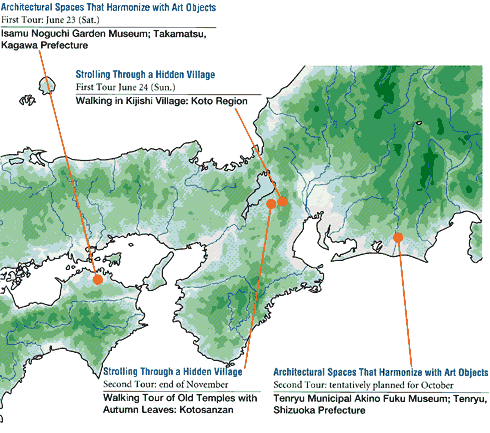| Architectural
Spaces That Harmonize with Art Objects Architecture is more than a box to house something in. On this tour we will visit museums that exemplify the future of museums in the 21st century. These facilities have been built to create a pleasing harmony between the works on display and the surrounding environment. |
| First Tour: June 23 (Sat.) Isamu Noguchi Garden Museum; Takamatsu, Kagawa Prefecture This garden museum that served as the atelier of one of the 20th century’s most noted sculptors, Isamu Noguchi, is located in Murei, known for Aji stone, which Noguchi visited in his later years. How did Noguchi communicate with stone? We will be visiting this site of great creativity to find out. |
| Second Tour: tentatively planned for October Tenryu Municipal Akino Fuku Museum; Tenryu, Shizuoka Prefecture This museum, whose materials of work center on the scenery of India, houses and exhibits a collection of work by the popular Japanese-style painter Akino Fuku. Crafted from natural materials such as wood, stone and clay, the museum has been designed to allow visitors to have memorable encounters with the works. After removing their shoes, visitors can explore the museum. |
| Strolling
Through a Hidden Village The Miho Museum’s special fall exhibition last year, “The World of Shirasu Masako,” attracted many visitors and was received warmly. On this tour, we will be making a visit to the village of Omi, which Shirasu herself once visited and which formed the basis for her well-known book, Kakurezato. |
| First Tour June 24 (Sun.) Walking in Kijishi Village: Koto Region If you continue on past Eigenji Temple, you come to a steep divide between the villages of Shinzan yukoku and Oguradani. This area, called "Rokkahata," is known along with Kyoto’s Kutsuki Village as the original home of kijishi, which can now be found throughout the country. Just as > it is written, the word refers to craftsman who carve undecorated masks, trays and bowls out of natural wood. In Kimigahata, located furthest in Rokkahata, worship of the imperial prince Koretaka continues to this day and old masks of the deities Daimyojin. We will be visiting the temple as well as other nearby places of interest. |
| Second Tour: end of November Walking Tour of Old Temples with Autumn Leaves: Kotosanzan Kotosanzan comes silently into view at the foot of Mt. Suzuka. Hyakusaiji Temple, was called the "Kobie in Koto," and is remembered for its splendor in ancient times when more than 300 priests were resident there even though it had damaged by Nobunaga’s corps. In addition at Kongorinji and Saimyoji Temple, there are numerous examples of exquisite architecture and Buddhist art works. All of these are ancient temples of the Tendai sect, and have long been known as places to delight visitors’ eyes with autumn leaves. |
 |